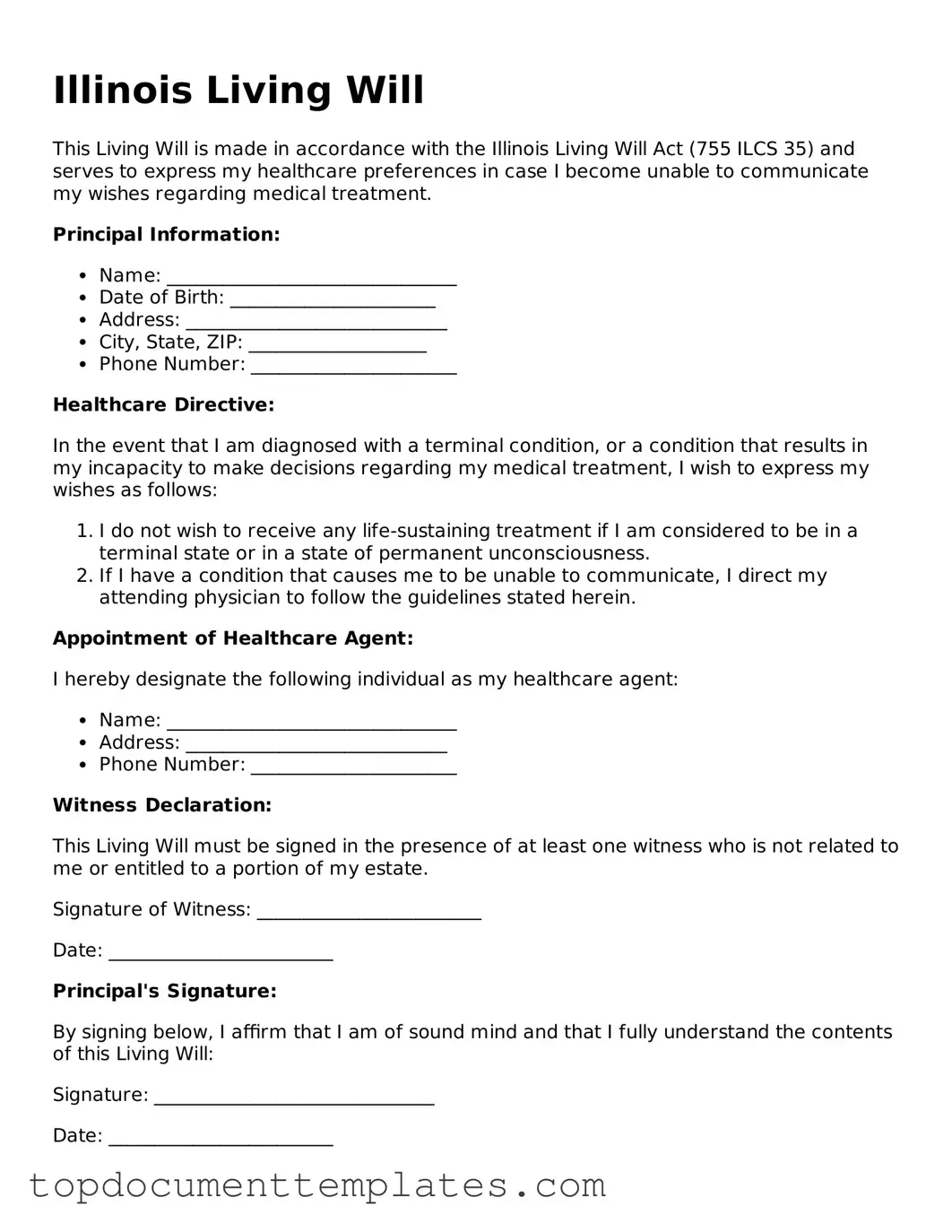Valid Living Will Form for Illinois State
In Illinois, the Living Will form plays a crucial role in healthcare planning, allowing individuals to express their wishes regarding medical treatment in case they become unable to communicate those wishes themselves. This document outlines specific preferences about life-sustaining treatments and interventions, ensuring that a person's values and desires are respected during critical medical situations. By completing a Living Will, individuals can specify whether they want to receive or refuse certain types of medical care, such as resuscitation efforts or artificial nutrition and hydration. This form not only provides clarity for healthcare providers but also alleviates the emotional burden on family members during difficult times. Understanding the requirements and implications of the Illinois Living Will form is essential for anyone looking to take control of their healthcare decisions and to ensure their wishes are honored when they cannot speak for themselves.
Similar forms
- Durable Power of Attorney for Health Care: This document allows an individual to appoint someone to make medical decisions on their behalf if they become incapacitated. Like a Living Will, it addresses healthcare preferences but focuses more on who will make decisions rather than outlining specific medical treatment preferences.
- Do Not Resuscitate (DNR) Order: A DNR order instructs medical personnel not to perform CPR if a patient stops breathing or their heart stops beating. Similar to a Living Will, it reflects a person's wishes regarding end-of-life care, particularly in emergency situations.
- Advance Directive: An advance directive encompasses both a Living Will and a Durable Power of Attorney for Health Care. It serves as a comprehensive document that outlines an individual’s healthcare preferences and designates a decision-maker, ensuring that their wishes are honored.
- Health Care Proxy: This document designates an individual to make health care decisions for someone who is unable to do so. While a Living Will specifies treatment preferences, a health care proxy focuses on who will make those decisions when the individual cannot.
- Last Will and Testament: A Last Will and Testament is essential for clearly stating how your assets are to be distributed after your passing and allows you to appoint guardians for minor children. For more information, you can visit documentonline.org/blank-last-will-and-testament.
- Physician Orders for Life-Sustaining Treatment (POLST): POLST is a medical order that outlines a patient’s preferences for life-sustaining treatment. Similar to a Living Will, it is used to communicate a patient’s wishes to healthcare providers, but it is more specific and is intended for those with serious health conditions.
Guidelines on Writing Illinois Living Will
Completing the Illinois Living Will form is an important step in expressing your healthcare preferences. This form allows you to communicate your wishes regarding medical treatment in situations where you may not be able to do so yourself. Follow these steps carefully to ensure that your form is filled out correctly.
- Begin by downloading the Illinois Living Will form from a reliable source, such as the Illinois Department of Public Health website.
- Read through the entire form to understand its sections and requirements.
- In the first section, enter your full name, address, and date of birth. Make sure this information is accurate.
- Next, indicate your preferences regarding life-sustaining treatment. You may choose to accept or refuse specific types of medical interventions.
- In the designated area, provide the names of any individuals you wish to appoint as your healthcare agents. These are people who will make decisions on your behalf if you are unable to do so.
- Sign and date the form at the bottom. This is crucial, as your signature validates your wishes.
- Consider having the form witnessed. Illinois law requires that your Living Will be signed in the presence of two witnesses or notarized.
- Once completed, make copies of the signed form. Distribute these copies to your healthcare providers, family members, and anyone else who may need to be aware of your wishes.
File Information
| Fact Name | Details |
|---|---|
| Governing Law | The Illinois Living Will form is governed by the Illinois Compiled Statutes, Chapter 755 ILCS 35. |
| Purpose | This form allows individuals to express their wishes regarding medical treatment in the event they become unable to communicate. |
| Eligibility | Any adult resident of Illinois can complete a Living Will to outline their healthcare preferences. |
| Witness Requirement | The form must be signed in the presence of two witnesses, who cannot be related to the individual or beneficiaries. |
| Revocation | A Living Will can be revoked at any time, either verbally or in writing, by the individual who created it. |
| Storage and Accessibility | It is recommended to keep the Living Will in a safe but accessible place and provide copies to family members and healthcare providers. |
Other Popular Living Will State Forms
How to Start a Living Will - This document can specify if you want to die naturally without intervention.
For a comprehensive understanding of the DA Form 31 and its requirements, you can visit OnlineLawDocs.com, which provides valuable resources and guidance for service members navigating the leave process while ensuring compliance with the necessary regulations.
Free Living Will Template - The availability of a Living Will can serve to reduce family stress during difficult times.
What Is a Living Will in Arizona - This document helps ensure that hospital staff are aware of your wishes for treatment."
